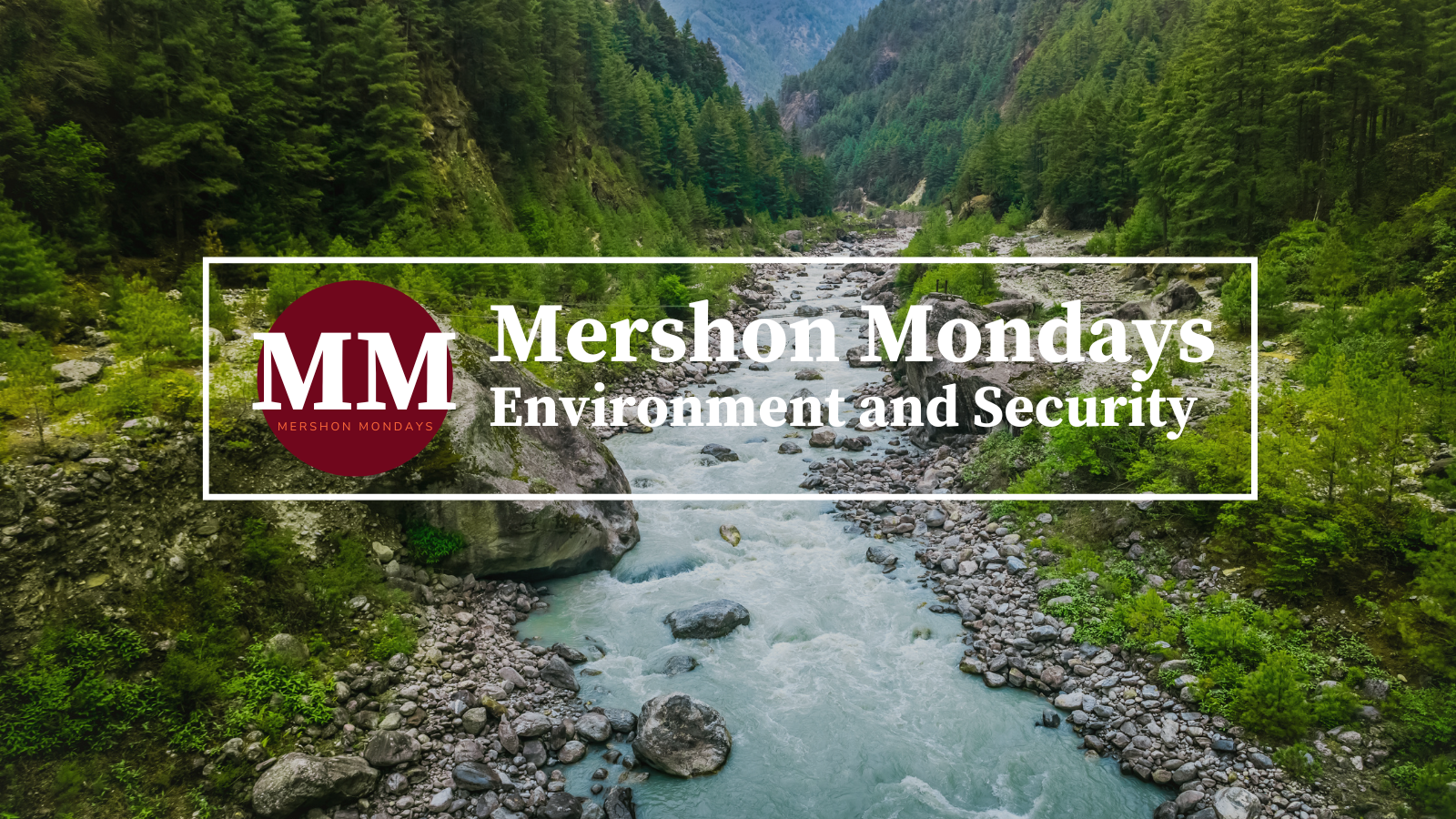Mershon Mondays October 6: Environment and Security
On October 6, our Mershon Mondays panel featured four specialists researching Environment and Security. Speakers emphasized how environmental threats and conflicts over resources pose security challenges which may further intensify in the face of climate change. At the same time, the panelists drew attention to the way the securitization of the environment can negatively impact human security by contributing to the marginalization of communities demarcated as threats.

Nick Breyfogle underscored how examining environmental issues in historical contexts offers important insights into present challenges. Breyfogle’s talk drew from the work he has done spearheading and co-leading the Environmental History Initiative, which brings together a multidisciplinary community of scholars dedicated to examining historical interactions between humans and the environment, and applying insights from the past to contemporary challenges. Breyfogle discussed the numerous interdisciplinary and historical projects he has conducted, exploring how negotiations over natural resources, such as water, have affected social relations in complex ways. He highlighted how, while water may be weaponized during conflicts and wars, it can also be an agent of integration. His talk also addressed water scarcity and its links to broader social issues, such as migration.

Seiba Issifu shared insights from his research on the intersection of environmental governance and security in Ghana’s artisanal and small-scale mining (ASM) sector. He revealed how ASM, despite employing over 1.1 million people and contributing more than 30% of Ghana’s gold output, is often portrayed as illegal and environmentally destructive. Issifu argued that this negative framing has led to militarized interventions, such as the deployment of police and military forces to shut down operations. Yet militarized interventions have not only failed to curb artisanal mining activities but have also intensified insecurity and social tensions between mining communities and state officials. Issifu called for a more inclusive and transparent resource governance framework that reflects the lived experiences of marginalized mining communities and avoids the pitfalls of “green violence.” He concluded with a powerful metaphor: “Like a tree without roots, a resource governance framework stripped of justice cannot withstand the storms of conflict nor bear the fruits of lasting peace and sustainability.”

Ben McKean examined why the climate crisis remains marginal in political theory and practice, particularly given fractures in the current political landscape. In the U.S., oil and gas interests have politically targeted climate science. The business community itself is divided: some anticipate profits from a warming world, while others caution that climate change could render entire sectors uninsurable. At the same time, a growing “disaster nationalism” has emerged—a form of ecofascism promoting hierarchy and exclusion, and blaming overpopulation rather than emissions. Despite these challenges, McKean maintained that political agency remains possible. The winning agent of climate change action will not be a single, hierarchical body. Instead, it will arise from a “movement ecology,” an inclusive collective capable of unified action across differences. This agent/movement will need to confront immense complexity and tradeoffs, but McKean believes and hopes that coordinated action is possible. He argued that episodic mobilizations must transform into lasting networks strong enough to bear the heavy political burdens that climate action demands.

Drawing from her research on fortress conservation in India, Paromita Bathija discussed how the establishment of national parks and wildlife preserves can disrupt the livelihoods and well-being of the communities that surround them. She conducted ethnographic research at the Nagarahole Tiger Reserve, where she found how the conservation area is geographically demarcated through racialized infrastructures of security. While tourists freely access these spaces, she finds that checkpoints, cameras, fences, and trenches establish a racialized boundary between local communities and the preserve, and exhibit deep continuities with the colonial past. Her research finds that this logic of securitization relies on a criminalization and racialization of locals as potential threats to conservation, which becomes extended to marginalize communities advocating for access to the resources that they rely on for sustenance.
The dialogue between panelists highlighted the complex ways that the environment is intertwined with social dynamics and long global histories. For example, several panelists discussed the diverse interests within the environmental movement, the links between colonialism and conservation in Global South contexts, and how environmental issues have intersected with polarization and division in the post-Cold War era. Ultimately, the discussion encouraged an environmental approach grounded in cooperation, justice, and inclusion rather than fear, control, and exclusion.
Blog by Nicholas Nyachega, Helen Murphey, and Julia Marino.

